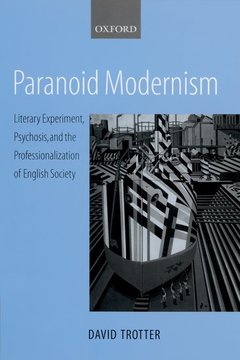Paranoid Modernism Literary Experiment, Psychosis, and the Professionalization of English Society
Langue : Anglais
Auteur : Trotter David

The early twentieth century notoriously saw an unprecedented wave of experiment in the arts. So intense was this activity that one can without exaggeration speak of a will to experiment (to 'make it new'). Where did that will to experiment come from? Why did it so insistently take the forms it took? Looking specifically at Modernism in England, David Trotter seeks answers in the careers of three novelists writing in the first decades of the century: Ford Madox Ford, D. H. Lawrence, and Wyndham Lewis. The context he proposes for their work is that of contemporary understandings of the function and value of expertise, and of the dilemmas peculiar to those possessing it. There is a certain madness about the expert's pursuit of expertise, and about his or her disappointment if expertise fails to yield adequate social recognition. The early psychiatric literature identified this madness as paranoia, and the textbooks and case-histories find an uncanny echo in Modernist fiction. In the obstinacy of their will to experiment, Ford, Lawrence, and Lewis wrote about, and lived, paranoia. To understand that obstinacy in its professional and psychiatric contexts is to approach from a new and unexpected angle the preoccupations with gender and with the politics of culture which currently characterize the study of Modernism. The energies it shook loose in their writing are energies which, evading absorption into the 'postmodern', continue to shape Western society and culture to this day.
Introduction, 1: A Brief History of Paranoia, 2: Paranoia, Psychoanalysis, and Cultural Theory, 3: Career Development: William Godwin, Wilkie Collins, and the Psychopathologies of Expertise, 4: Towards an Epidemiology of Paranoid Narrative, 5: One of Whom? Lord Jim and 'Ability in the Abstract', 6: Ford's Impressionism, 7: The Will-to-Abstraction: Hulme, Lewis, Lawrence, 8: D. H. Lawrence: Women in Love, Men in Madness, 9: Wyndham Lewis's Professions, 10: Beyond Modernism, Beyond Paranoia, Index
Date de parution : 09-2001
Ouvrage de 368 p.
14.6x22.4 cm
Thèmes de Paranoid Modernism :
© 2024 LAVOISIER S.A.S.



